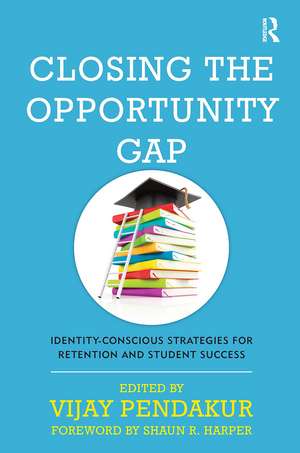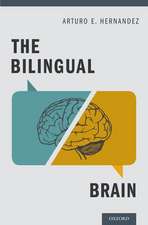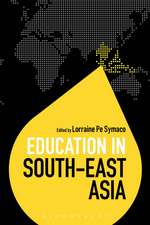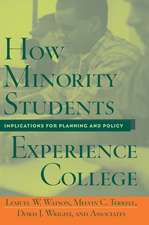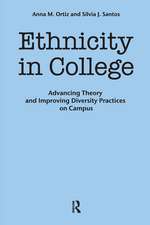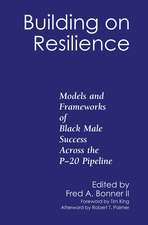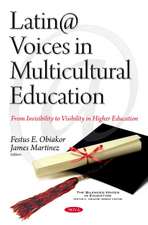Closing the Opportunity Gap: Identity-Conscious Strategies for Retention and Student Success
Editat de Vijay Pendakuren Limba Engleză Paperback – 29 feb 2016
| Toate formatele și edițiile | Preț | Express |
|---|---|---|
| Paperback (1) | 277.18 lei 6-8 săpt. | |
| Taylor & Francis – 29 feb 2016 | 277.18 lei 6-8 săpt. | |
| Hardback (1) | 998.21 lei 6-8 săpt. | |
| Taylor & Francis – 8 mar 2016 | 998.21 lei 6-8 săpt. |
Preț: 277.18 lei
Nou
Puncte Express: 416
Preț estimativ în valută:
53.04€ • 57.60$ • 44.56£
53.04€ • 57.60$ • 44.56£
Carte tipărită la comandă
Livrare economică 23 aprilie-07 mai
Preluare comenzi: 021 569.72.76
Specificații
ISBN-13: 9781620363126
ISBN-10: 1620363127
Pagini: 188
Dimensiuni: 152 x 229 x 13 mm
Greutate: 0.28 kg
Ediția:1
Editura: Taylor & Francis
Colecția Routledge
Locul publicării:Oxford, United Kingdom
ISBN-10: 1620363127
Pagini: 188
Dimensiuni: 152 x 229 x 13 mm
Greutate: 0.28 kg
Ediția:1
Editura: Taylor & Francis
Colecția Routledge
Locul publicării:Oxford, United Kingdom
Public țintă
PostgraduateNotă biografică
Vijay Pendakur Dr. Vijay Pendakur serves as an Associate Vice President for Student Affairs at California State University – Fullerton. Prior to joining Cal State Fullerton, Dr. Pendakur served as the Director for the Office of Multicultural Student Success, a department charged with increasing the retention and persistence of low-income students, first generation students, and students of color at DePaul University in Chicago. He holds a bachelor's degree in history and East Asian studies from the University of Wisconsin, Madison, a master's degree in U.S. history from the University of California, San Diego, and a doctorate in education from DePaul University. Shaun R. Harper, PhD, is a professor in the Marshall School of Business at the University of Southern California, and is the USC Race and Equity Center Executive Director. He is an expert on racial, gender, and LGBT issues in corporations, law firms, Hollywood production companies, and universities. He also is an expert on college sports. He offers organizations live, and high-quality virtual experiences on a range of topics pertaining to equity, diversity, and inclusion in business and on campus.Dr. Harper has consulted with more than 200 businesses and institutions on strategies related to equity, diversity, and inclusion. He has published over 100 peer-reviewed journal articles and other academic publications, and procured $13 million in research grants. He is presently working on Equity, Diversity, and Inclusion in Business, his 13th book. His research has been cited in over 12,000 published studies. The Wall Street Journal, New York Times, Fortune, Washington Post, Black Enterprise, and several thousand other news outlets have quoted Professor Harper and featured his research. He has been interviewed on CNN, ESPN, and NPR.Prior to becoming a faculty member, he was Assistant Director of MBA Admissions for the Indiana University Kelley School of Business. Dr. Harper spent a decade at the Universi
Cuprins
Foreword. Shaun R. Harper Introduction. Two distinct paths and a missed opportunity. Vijay Pendakur1. Family Engagement for First-Generation Families and Families of Color. Andrea Arzuaga 2. Retaining and Graduating Empowered Men of Color. Eric Mata and André Bobb 3. Identity-Conscious Approaches to First-Year, Peer-to-Peer Retention Programs. Sara Furr 4. The Promise and Challenge of Leadership Development for Women of Color. Tomika Rodriguez 5. Social Capital. Identity-Conscious Leadership Development Curricula for Students of Color. Jeff Brown and Nydia María Stewart 6. Career Discernment and Career Capital Development for Students of Color and First-Generation College Students. Richard P. Morales and Eric Mata 7. Empowerment Agents. Developing Staff and Faculty to Support Students at the Margins. Sumun L. Pendakur 8. Food, Shelter, and Success. Mitigating Risk for Low-Income College Students. Art Munin and Michele Enos Conclusion. Tying It All Together. Vijay Pendakur Afterword. Vijay Pendakur Editor and Contributors Index
Recenzii
"Vijay Pendakur's edited volume Closing the Opportunity Gap: Identity-conscious Strategies For Retention and Student Success is written for university staff members who focus on the academic success of low income students and students of color. It is not a scholarly volume aimed at academics, but more of a how-to guide. It consists of eight chapters written by practitioners, so do not look for theory or many references to research on this topic.
Overall, Closing the Opportunity Gap may provide useful information for those who work in college retention offices, financial aid offices, counseling offices, and even admissions offices.”
Teachers College Record
“This timely book explores retention strategies in a novel and critical way. Focused on identity conscious strategies, this book rethinks retention strategies for the diverse student populations on campus and the identity dimensions they bring.
To address the equity imperative in college completion we must rethink who our students are and what identities they carry and how that shapes their educational experience. This volume provides the playbook to guide us in planning and programming for student success in an identity-conscious way.
The strategies this book provides could not be more urgent…a book to keep on your desk as a continuous reference rather than a bookshelf.”
Estela Mara Bensimon, Professor and Director, and Eric Felix, Research Assistant, both at the Center for Urban Education
University of Southern California
"Closing the achievement gap for low-income, first-generation, and students of color in American higher education needs to be a national priority. This book is a roadmap that outlines the dimensions of a systemic approach towards decreasing the attainment gap for our most under-represented students. The upfront focus on racial identity and the need for systemic change make this a ‘must-read’ for college presidents, provosts and senior administrators who seek real equity at their colleges and universities.”
Kevin Kruger, President
NASPA – Student Affairs Administrators in Higher Education
“Guided by an inclusive and positive vision, the chapters recommend new approaches to identity-conscious programming that can be woven across the institution—integrative and collaborative evidence-based practices toward outcomes any institution can achieve. The collection offers silo-busting advice on ways to address the opportunity gap and help new majority students thrive."
Susan Albertine, PhD, Vice President, Office of Diversity, Equity, and Student Success
Association of American Colleges & Universities
Overall, Closing the Opportunity Gap may provide useful information for those who work in college retention offices, financial aid offices, counseling offices, and even admissions offices.”
Teachers College Record
“This timely book explores retention strategies in a novel and critical way. Focused on identity conscious strategies, this book rethinks retention strategies for the diverse student populations on campus and the identity dimensions they bring.
To address the equity imperative in college completion we must rethink who our students are and what identities they carry and how that shapes their educational experience. This volume provides the playbook to guide us in planning and programming for student success in an identity-conscious way.
The strategies this book provides could not be more urgent…a book to keep on your desk as a continuous reference rather than a bookshelf.”
Estela Mara Bensimon, Professor and Director, and Eric Felix, Research Assistant, both at the Center for Urban Education
University of Southern California
"Closing the achievement gap for low-income, first-generation, and students of color in American higher education needs to be a national priority. This book is a roadmap that outlines the dimensions of a systemic approach towards decreasing the attainment gap for our most under-represented students. The upfront focus on racial identity and the need for systemic change make this a ‘must-read’ for college presidents, provosts and senior administrators who seek real equity at their colleges and universities.”
Kevin Kruger, President
NASPA – Student Affairs Administrators in Higher Education
“Guided by an inclusive and positive vision, the chapters recommend new approaches to identity-conscious programming that can be woven across the institution—integrative and collaborative evidence-based practices toward outcomes any institution can achieve. The collection offers silo-busting advice on ways to address the opportunity gap and help new majority students thrive."
Susan Albertine, PhD, Vice President, Office of Diversity, Equity, and Student Success
Association of American Colleges & Universities
Descriere
This book contends that the gap between cultural/diversity centers and institutional retention efforts is both a missed opportunity and one that perpetuates the opportunity gap between students of color and low-income students and their peers.
